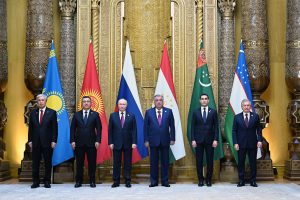An October 8-10 summit in Dushanbe brought together the presidents of Russia, Tajikistan, Kyrgyzstan, Kazakhstan, Uzbekistan, Turkmenistan, Belarus, Azerbaijan, and Armenia. The three-day event, which locked down the Tajik capital’s city center and was accompanied by reports of short internet blackouts, involved bilateral meetings between Russian President Vladimir Putin and Tajik President Emomali Rahmon, a Russia-Central Asia summit, and a larger Commonwealth of Independent States (CIS) gathering.
The agenda focused on increased security cooperation, labor migration management, and continued economic integration to counteract Moscow’s declining regional leverage since the 2022 Western sanctions. As China continues expanding its regional investments, the EU has increased engagement with Central Asia through trade and infrastructure funding. Meanwhile, none of the Central Asian governments has backed Russia’s invasion of Ukraine. Nevertheless, Moscow looks to project relevance in what it considers its sphere of strategic influence.
Dushanbe faced international pressure to act on the International Criminal Court’s arrest warrant for Putin. But for Tajikistan, the stakes are high: protecting approximately 1.2 million migrant workers in Russia who supply Tajikistan’s cash-strapped economy with critically important remittances. Following the March 2024 Crocus City Hall terrorist attack linked to Tajik militants, Dushanbe has sought concrete protections for its labor migrants from law enforcement raids, increased bureaucratic scrutiny, and stricter migration regulations to prevent mass returns that could trigger unemployment and potential religious radicalization.
Russia and Tajikistan signed 16 documents centered around a joint statement on deepening strategic partnership and alliance relations. Three migration-focused agreements addressed medical examinations for Tajik workers entering Russia, organized labor recruitment protocols, and the legal status of migration representatives in both countries. The migration agreements may provide Tajikistan with diplomatic cover, but their enforcement in Russia – where anti-Central Asian sentiment runs high – remains uncertain.
Additional agreements covered bilateral trade expansion, cooperation between Russia’s and Tajikistan’s security apparatuses, transport infrastructure development, and a Tajik-Russian industrial park investment. Sector-specific memoranda addressed education, healthcare oversight, telecommunications, and uranium tailings rehabilitation at the Digmai facility.
The CIS summit produced 19 agreements, including a declaration on regional energy security cooperation, a military cooperation concept through 2030, counterterrorism and border security programs for 2026-2030, and measures against transnational crime. Turkmenistan was designated to assume the 2026 CIS chairmanship. CIS leaders also emphasized aligned positions on international law, sovereignty, and noninterference – coded language signaling neither Central Asian support for the Russian invasion of Ukraine nor acceptance of Western pressure on Russia.
The summit exposed fundamental contradictions in Moscow’s position. Russia needs the Central Asian labor force to fill demographic gaps and war-related shortages, yet domestic xenophobia and the need for external enemies to justify Putin’s political crackdowns at home threaten the very workers Russia depends on. Russia also positions itself as a regional security guarantor, but its resources are stretched by the war in Ukraine, limiting delivery capacity and sidelining Moscow in the recent Armenia-Azerbaijan and Tajikistan-Kyrgyzstan conflicts.
Central Asian states, in turn, are executing careful hedging strategies. Kazakhstan refuses to recognize Donetsk and Luhansk as independent from Ukraine, citing sovereignty principles that implicitly challenge Russia’s territorial claims. The region hosted EU and China summits in 2025, deliberately diversifying its partnerships. Azerbaijan’s presence at the summit carried particular weight: Putin admitted Russian culpability in the December 2024 Azerbaijan Airlines crash over Kazakhstan, attempting damage control after Baku accused Russian ground fire of downing the aircraft.
The gap between symbolic gestures and substantive outcomes will determine whether Moscow can arrest its influence decline. Central Asian governments need Russian markets and security cooperation, but increasingly view Moscow as one option among several rather than the dominant patron.





























